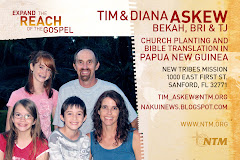Malaria runs rampant, indiscriminately takes its toll on young and old alike. Painful boils incapacitate even the strongest men. Chest infections due to almost constant smoke inhalation are common. Neonatal care is almost non-existent. Run-away ear infections cause permanent hearing loss. Traditional first-aid treatments are more counter-productive than just doing nothing. Poor hygiene habits breed germs and disease. These are some of the realities in the Nakui world when it comes to health care.
Beginning in the 1980’s, NTM brought major improvement in medical treatment and training to the Nakui area. An aid post was first established in Iteri, and later in Nakui where indigenous volunteers were trained in first-aid and basic medicine. The result is that infant mortality has been cut from 50% to below 5%, and fatalities from malaria is now exception and not the rule. People in all directions cross mountains and wade through jungle swamps to receive treatment from these trained volunteers. Populations are growing, and the sound of groups of children playing can once again be heard in these villages.
But the question always remained … what happens to these medical programs after NTM moves out of these areas? With no official certification, how will these remote villages gain access to medicine and supplies? Who will help train the next generation of medical volunteers? There have always been more questions than answers. Until now.
This past year, in cooperation with the Sepik provincial health department, NTM began organizing and sponsoring a 6-week village health volunteer (VHV) training program. Upon graduation medical volunteers in these remote villages are certified to receive medicine and supplies from the government and to perform basic medical and neonatal treatment. Presently a VHV course is in full-swing at the Iteri airstrip, with approximately ten medical workers in training, including two Nakui men (Auiyo and Kibo). Though this may seem like a small development, this is the very first time these tribes have received ANY kind of medical education or training from the government. More importantly, this program puts these remote people groups on the health department’s radar, and means access to free medicine (although the airplane freight cost sure isn’t free!) and ongoing government-sponsored training. Windows of hope like this are rare for the Nakuis … I hope and pray both they will take full advantage of it.
News and stories about the Askew family ministry in Papua New Guinea
Welcome to our blog "The Nakui Jungle Beat". Just as Nakui people ring out an urgent message by rythmically hitting a hollowed out log or "Ow", we want to share an important message with you. What is our message? It is that through the grace of God, the Nakui people have found hope and meaning through the Gospel of Jesus Christ. We hope this tool will allow us to pass along the story of how God's grace continues to shine in this remote corner of the PNG jungle. Thanks for visiting!
Pics of Feb '10 Nakui Trip
Blog Archive
Askew Praise and Prayer
- Feb 9th: Well ... another broken bone in the Askew family. It's TJ again this time. He was up picking flowers in a tree and when a branch broke and he fell on his right shoulder. Besides some bruising, his shoulder seems fine. But his collar bone didn't fare so well and is fractured. We spoke with our doctor on the phone and doesn't think there's much he can do so we've got him in a sling and on pain meds and we'll let him heal up here in Wewak. Poor TJ is in a lot of pain tonight and it'll probably be a rough night's sleep. Thanks for your prayers.
New Askew Family Photo Card

Request to have one sent to you (use email address below)
Want to contact the Askews? Use this email address:
Back-to-English Version of Nakui Romans 3:23,24
"We are all people who do bad actions. We all live down below, our bad actions are many. Therefore not one person can go and live with God in heaven. We live like that, but listen, God had mercy on us. Truly, he helped us without repayment. He sent his Son Jesus Christ to us people of the ground, in order to purchase our sins. He purchased them and now He calls those of us who believe this his straight men and women."

